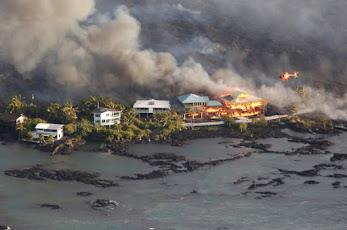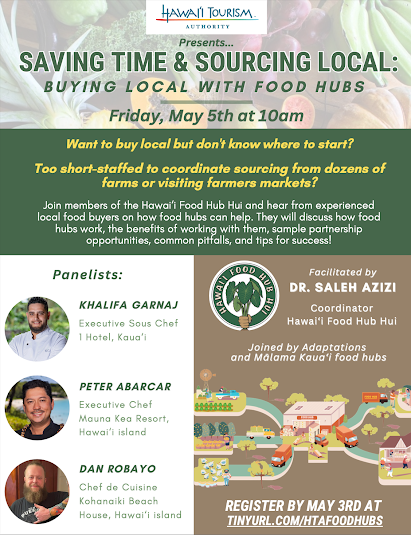 |
| Kaʻū Coffee producers are invited to register for the annual Hawai'i Coffee Association Cupping Competition through Wednesday, May 3. See https://hawaiicoffeeassoc.org/event-5231845 |
Hawai'i Coffee Association partners with Pacific Coffee Research to administer this 14th annual statewide cupping competition. PCR selected a panel of Hawai'i-based licensed Q Graders to assess and score samples using SCA protocol and methodology at its Kona lab.
Entries must be received (not sent in) by May 3. Entry fee is $100 per entry. Register at https://hawaiicoffeeassoc.org/event-5231845. Contact Cupping Competition Committee Chair Brittany Horn at brit@pacificcoffeeresearch.com, or call (808) 494-2643 with any questions or comments.
To read comments, add your own, and like this story, see facebook.com/kaucalendar. See latest print edition at kaucalendar.com, in the mail and on stands.
THE LAST PUBLIC INPUT FOR THE STATE HAZARD MITIGATION PLAN UPDATE will be a meeting on Wednesday, May 3 from 5 p.m. to 7 p.m. with a virtual option, and through sending in comments until May 9, only through https://www.surveymonkey.com/r/HISHMP2023.
Links to the virtual meeting May 3 will be provided soon.
COVER THE LOAD IN THE BACK OF THE TRUCK or be fined is a reminder sent out by Hawai’i Police Department. "While transporting cargo on any public roadway or highway, your load must be covered. Most of the litter on or near our roadways is not intentionally thrown. Rather, it has more often than not, been blown out of open-bed pickup trucks, thereby potentially causing a road hazard or a traffic collision."
A statement from HPD sats that anytime traveling with a loaded truck bed, trailer, or roof rack, make sure to properly secure the load by:
Tying down the load with rope or straps.
Tying large objects directly to the vehicle or trailer.
Covering the entire load with a sturdy tarp (which is then tied down) or netting.
HPD also recommends, "After tying down a load double check to make sure that nothing can slide, fall, or shift out of your vehicle. Check your car manual to make sure you aren’t overloading your vehicle."
According to Hawai‘i Revised Statute 291C-13231, the penalties for first-time violators of the law can expect a fine of $250 to $500. A second violation, if cited within a year after the first, delivers a fine of between $500 and $750, plus suspension of the vehicle registration and/or license of the driver for at least five working days.
THE LAST PUBLIC INPUT FOR THE STATE HAZARD MITIGATION PLAN UPDATE will be a meeting on Wednesday, May 3 from 5 p.m. to 7 p.m. with a virtual option, and through sending in comments until May 9, only through https://www.surveymonkey.com/r/HISHMP2023.
Links to the virtual meeting May 3 will be provided soon.
 |
| More than 700 homes were lost in the 2018 eruption. Public input is requested for the State Hazard Mitigation Plan. |
Federal Emergency Management Agency approval and State adoption of regularly updated State Hazard Management Plans are mandatory for State of Hawai‘i to obtain federal assistance for hazard mitigation and for repair and replacement of infrastructure damaged in natural disasters.
James Barros, administrator of HawaI'i Emergency Management Administration, said the plan is updated every five years "because they’re a key tool we use to reduce or eliminate the harm caused by the hazards we face across Hawai‘i. The State and counties rely on these hazard mitigation plans to guide their efforts to protect communities against the threats of flooding, hurricanes, wildfires, tsunamis and other hazards." Barros noted that hazards evolve over time and are different from island to island.
James Barros, administrator of HawaI'i Emergency Management Administration, said the plan is updated every five years "because they’re a key tool we use to reduce or eliminate the harm caused by the hazards we face across Hawai‘i. The State and counties rely on these hazard mitigation plans to guide their efforts to protect communities against the threats of flooding, hurricanes, wildfires, tsunamis and other hazards." Barros noted that hazards evolve over time and are different from island to island.
See https://experience.arcgis.com/experience/f60e1a0a7dfc4069a0ea862108023c43/page/Public-Participation/. Also visit the HI-EMA website at https://dod.hawaii.gov/hiema/sert-resources/hazard-mitigation/.
A statement from HPD sats that anytime traveling with a loaded truck bed, trailer, or roof rack, make sure to properly secure the load by:
Tying down the load with rope or straps.
Tying large objects directly to the vehicle or trailer.
Covering the entire load with a sturdy tarp (which is then tied down) or netting.
HPD also recommends, "After tying down a load double check to make sure that nothing can slide, fall, or shift out of your vehicle. Check your car manual to make sure you aren’t overloading your vehicle."
According to Hawai‘i Revised Statute 291C-13231, the penalties for first-time violators of the law can expect a fine of $250 to $500. A second violation, if cited within a year after the first, delivers a fine of between $500 and $750, plus suspension of the vehicle registration and/or license of the driver for at least five working days.
To read comments, add your own, and like this story, see facebook.com/kaucalendar. See latest print edition at kaucalendar.com, in the mail and on stands.
USDA RURAL DEVELOPMENT HAS COME OUT WITH NEW GRANT opportunities, along with resources, events and learning. Its latest newsletter says there is $1 billion of Inflation Reduction funds available under the Rural Energy for America. There are funding opportunities for infrastructure community and economic development, and funding for tribal communities. Read the entire newsletter Innovation Matters at https://content.govdelivery.com/accounts/USDARD/bulletins/355dc04


.jpeg)

.png)
.jpg)
.jpg)
